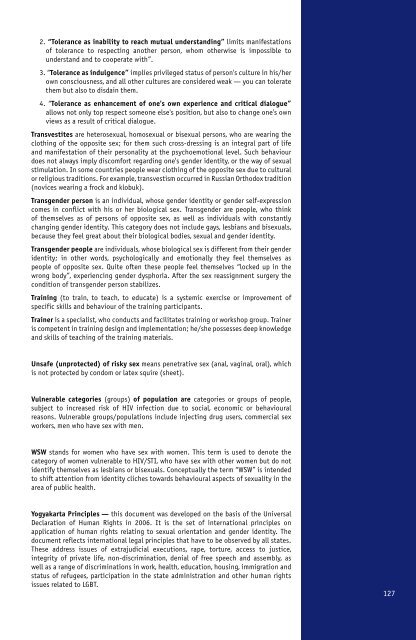Social Work with People Practicing Same-Sex ... - ILGA Europe
Social Work with People Practicing Same-Sex ... - ILGA Europe
Social Work with People Practicing Same-Sex ... - ILGA Europe
Create successful ePaper yourself
Turn your PDF publications into a flip-book with our unique Google optimized e-Paper software.
2. “Tolerance as inability to reach mutual understanding” limits manifestations<br />
of tolerance to respecting another person, whom otherwise is impossible to<br />
understand and to cooperate <strong>with</strong>”.<br />
3. “Tolerance as indulgence” implies privileged status of person's culture in his/her<br />
own consciousness, and all other cultures are considered weak — you can tolerate<br />
them but also to disdain them.<br />
4. “Tolerance as enhancement of one's own experience and critical dialogue”<br />
allows not only top respect someone else's position, but also to change one's own<br />
views as a result of critical dialogue.<br />
Transvestites are heterosexual, homosexual or bisexual persons, who are wearing the<br />
clothing of the opposite sex; for them such cross-dressing is an integral part of life<br />
and manifestation of their personality at the psychoemotional level. Such behaviour<br />
does not always imply discomfort regarding one's gender identity, or the way of sexual<br />
stimulation. In some countries people wear clothing of the opposite sex due to cultural<br />
or religious traditions. For example, transvestism occurred in Russian Orthodox tradition<br />
(novices wearing a frock and klobuk).<br />
Transgender person is an individual, whose gender identity or gender self-expression<br />
comes in conflict <strong>with</strong> his or her biological sex. Transgender are people, who think<br />
of themselves as of persons of opposite sex, as well as individuals <strong>with</strong> constantly<br />
changing gender identity. This category does not include gays, lesbians and bisexuals,<br />
because they feel great about their biological bodies, sexual and gender identity.<br />
Transgender people are individuals, whose biological sex is different from their gender<br />
identity; in other words, psychologically and emotionally they feel themselves as<br />
people of opposite sex. Quite often these people feel themselves “locked up in the<br />
wrong body”, experiencing gender dysphoria. After the sex reassignment surgery the<br />
condition of transgender person stabilizes.<br />
Training (to train, to teach, to educate) is a systemic exercise or improvement of<br />
specific skills and behaviour of the training participants.<br />
Trainer is a specialist, who conducts and facilitates training or workshop group. Trainer<br />
is competent in training design and implementation; he/she possesses deep knowledge<br />
and skills of teaching of the training materials.<br />
Unsafe (unprotected) of risky sex means penetrative sex (anal, vaginal, oral), which<br />
is not protected by condom or latex squire (sheet).<br />
Vulnerable categories (groups) of population are categories or groups of people,<br />
subject to increased risk of HIV infection due to social, economic or behavioural<br />
reasons. Vulnerable groups/populations include injecting drug users, commercial sex<br />
workers, men who have sex <strong>with</strong> men.<br />
WSW stands for women who have sex <strong>with</strong> women. This term is used to denote the<br />
category of women vulnerable to HIV/STI, who have sex <strong>with</strong> other women but do not<br />
identify themselves as lesbians or bisexuals. Conceptually the term “WSW” is intended<br />
to shift attention from identity cliches towards behavioural aspects of sexuality in the<br />
area of public health.<br />
Yogyakarta Principles — this document was developed on the basis of the Universal<br />
Declaration of Human Rights in 2006. It is the set of international principles on<br />
application of human rights relating to sexual orientation and gender identity. The<br />
document reflects international legal principles that have to be observed by all states.<br />
These address issues of extrajudicial executions, rape, torture, access to justice,<br />
integrity of private life, non-discrimination, denial of free speech and assembly, as<br />
well as a range of discriminations in work, health, education, housing, immigration and<br />
status of refugees, participation in the state administration and other human rights<br />
issues related to LGBT.<br />
127


